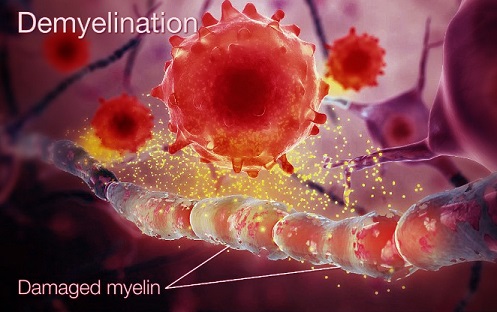Swedish Study Alarmingly Finds That COVID Infections Increases the Risk of Developing Demyelinating Diseases
Nikhil Prasad Fact checked by:Thailand Medical News Team Dec 01, 2024 4 months, 3 weeks, 4 days, 5 hours, 2 minutes ago
Medical News: A recent study from Swedish researchers reveals concerning links between severe COVID-19 infections and an increased risk of developing neurological conditions known as demyelinating diseases. These findings could have significant implications for public health and long-term COVID-19 management.
 Swedish Study Alarmingly Finds That COVID Infections Increases the Risk of Developing
Swedish Study Alarmingly Finds That COVID Infections Increases the Risk of Developing
Demyelinating Diseases.
The study, conducted by researchers from Örebro University, Karolinska Institutet, University of Gothenburg, and other institutions, assessed the Swedish population aged 3 to 100 years to investigate the impact of COVID-19 on the nervous system. This
Medical News report explores these findings and their broader implications for global health.
What Are Demyelinating Diseases?
Demyelinating diseases affect the protective covering of nerves in the central nervous system, potentially leading to conditions like multiple sclerosis (MS). These diseases often emerge following infections, suggesting that immune system triggers may play a role.
Researchers sought to determine whether COVID-19 could act as such a trigger, particularly given the virus's known effects on the central nervous system. The study focused on two outcomes: non-MS demyelinating diseases and MS itself.
The Study in Detail
Using data from Sweden's national healthcare registers, the researchers analyzed nearly 10 million individuals between January 2020 and November 2022. They categorized participants into groups based on COVID-19 infection status and severity, using hospital admissions as a marker for severe cases.
The study team employed advanced statistical models to adjust for factors such as age, gender, and existing health conditions. They also examined the timeline of diagnoses, finding that many occurred within six months of severe COVID-19 hospitalization.
Key Findings
The study identified clear trends linking severe COVID-19 infections with higher rates of both MS and other demyelinating diseases:
-Among individuals hospitalized for COVID-19, the rate of non-MS demyelinating disease diagnoses was 9 per 100,000 person-years, compared to 3.8 in the uninfected group. This translated to a hazard ratio of 2.35, indicating more than double the risk.
-For MS, hospitalized individuals showed a rate of 21 diagnoses per 100,000 person-years, more than double the rate in uninfected individuals (9.5 per 100,000). The hazard ratio for this group was 2.48.
The researchers noted that these conditions appeared disproportionately in individuals without prior comorbidities, underscoring the unique role of COVID-19 in triggering these outcomes.
Possible Mechanisms
While the exact mechanisms remain unclear, the researchers propose several potential explanations:
&
nbsp;
-Immune Overactivation: Severe COVID-19 can trigger an immune "cytokine storm," potentially damaging nerve cells.
-Autoimmunity: The immune response to the virus might mistakenly attack the body's own nervous tissue.
-Delayed Effects: Some demyelinating diseases take years to manifest, raising questions about future risks for COVID-19 survivors.
Broader Implications
These findings underscore the importance of monitoring COVID-19 survivors, particularly those hospitalized for severe cases. The study highlights the need for ongoing research into long-term effects.
The study also raises questions about healthcare surveillance. Could increased medical contact during COVID-19 recovery lead to earlier diagnoses of pre-existing conditions? Or is COVID-19 itself a direct trigger?
Conclusions
This study, the largest of its kind to date, provides compelling evidence of an association between severe COVID-19 and an increased risk of demyelinating diseases. While the exact causality remains to be established, the findings highlight the virus's potential to impact neurological health.
Longer follow-up studies are needed to confirm these trends and understand the full spectrum of risks. Healthcare providers should remain vigilant, particularly for individuals recovering from severe COVID-19. Public health strategies must consider these findings as part of long-term pandemic response planning.
The study findings were published in the peer-reviewed journal: Brain Communications.
https://academic.oup.com/braincomms/article/6/6/fcae406/7909395
For the latest COVID-19 News, keep on logging to Thailand
Medical News.
Read Also:
https://www.thailandmedical.news/news/breaking-sars-cov-2-infections-can-also-cause-long-term-peripheral-nerve-demyelination-and-axonal-loss
https://www.thailandmedical.news/news/extensive-brain-demyelination-linked-to-post-covid-depression
https://www.thailandmedical.news/news/researchers-warn-that-covid-19-jabs-can-cause-central-nervous-system-inflammatory-demyelinating-diseases
https://www.thailandmedical.news/news/breaking-covid-19-news-study-finds-that-brain-demyelination-is-common-in-many-post-covid-individuals,-especially-in-those-with-symptoms-of-depression
https://www.thailandmedical.news/news/breaking-news-scientists-from-baltimore-warns-that-sars-cov-2-infections-or-covid-19-vaccines-can-cause-new-onset-neuromyelitis-optica
https://www.thailandmedical.news/news/covid-19-news-medical-researchers-from-kunming-china-warn-that-covid-19-can-trigger-tumefactive-demyelinating-lesions-in-multiple-sclerosis-patients
https://www.thailandmedical.news/news/swedish-study-shows-sars-cov-2-also-causes-myelin-oligodendrocyte-glycoprotein-associated-disorder-mogad,-a-cns-autoimmune-disease
https://www.thailandmedical.news/news/more-great-news-stanford-yale-study-shows-even-mild-sars-cov-2-infection-can-cause-multi-lineage-cellular-dysregulation-and-myelin-loss-in-the-brain
https://www.thailandmedical.news/news/anacardic-acid-from-cashew-nut-shells-can-repair-damaged-nerves-caused-by-demyelination-according-to-new-study
